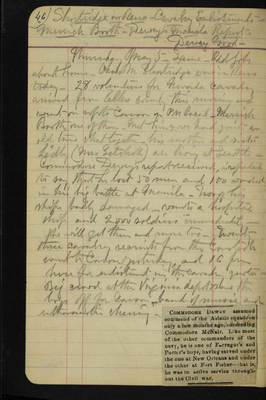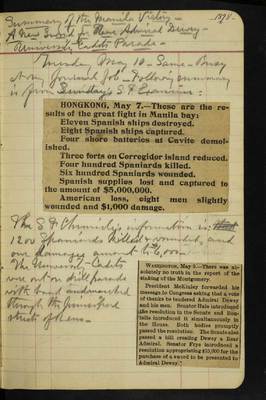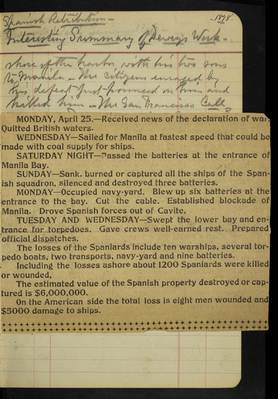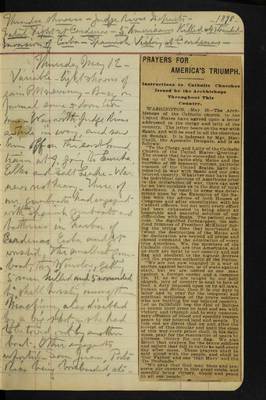Pages
74_048_c
SAN FRANCISCO CHRONICLE. WEDNESDAY, MAY 4, 1898
HERO OF THE MANILA FIGHT
Long and Active Career of Commodore Dewey
SAW STIRRING TIMES IN THE CIVIL WAR.
HE WAS WITH THE OLD MISSISSIPPI WHEN SHE WAS DESTROYED.
Prophetic Toast at a Banquet Just Before the Commander Left Home for the China Station.
Special Dispatch to the "CHRONICLE."
NEW YORK, May 3. -- Commodore George Dewey, the hero of the Manila flight, first breathed the air of these United States in the green hills of Vermont sixty-one years ago. He has seen red-hot fighting between then and now, enough to know he hits hardest who hits straightest and oftenest and keeps it up the longest.
Dewey was appointed to the Naval Academy from Vermont when he was 17 years old. When he graduated in 1858, he went with the steam frigate Wabash on a cruise with the Mediterranean squadron, which lasted until 1859. Ensign Dewey was home when Fort Sumter was fired upon. Just one week later, April 10, 1861, he received his commission as Lieutenant. He was assigned at once to the steam sloop Mississippi, which was to take part in the fierce fighting of the west gulf squadron. The Mississippi was a sidewheeler of seven guns, and was commanded by Commander Melanethon Smith. The west gulf squadron went at once to the Mississippi river to force it's way up.
"The History of Our Navy" thus describes the sort of things the men on the Mississippi experienced when they preceded Farragut up past New Orleans:
"The Pensacola and Mississippi steamed slowly with their black hulls at regular intervals sheeting the air with lurid fire as they replied to the forts. Abreast of St. Philip, where the Confederate fire was hottest, they drew in so close that the gunners afloat and those ashore heartily cursed each other as they worked." The Mississippi was with the squadron again when it ran down past New Orleans on the way back, fair targets for nineteen big guns at close range.
The hardest fight the Mississippi ever was in was the one that ended her. The fleet was trying to get by Port Huron with its powerful batteries. None of the squadron got by. The Mississippi did not even get down as close to the batteries as most of the other ships did. She ran aground in the fog and stuck hard and fast. She was about opposite the main battery when the smoke cleared away. In thirty minutes she was struck 250 times. She was shot full of holes like a colander. Her crew climbed into boats on the side opposite the forts, and, after setting her on fire, made for the other side of the river under a withering rifle fire. She grew lighter as she burned and finally floated off. Opposite the last battery her blazing, popping progress ended in a tremendous explosion, and her men, safe on shore, knew the Mississippi would never be under fire again.
In July 1863, Dewey was on one of the gunboats that engaged the Confederates below Donaldsonville. In 1864 he was attached to the North Atlantic blockading squadron assigned to the steam gunboat Agawam. The Agawam was one of a great crescent of war ships, big and little. He was then in the European squadron, first on the Kearsarge and then on the frigate Colorado, the flagship. In 1868 he was assigned to duty at the Naval Academy. In 1870 he received his first command, that of the Narragansett, which was employed on special service until 1875. The last part of the time during which he commanded the Narragansett, Dewey was a commander. His Pacific Coast record is well known.
At a dinner given to Commodore Dewey at the Metropolitan Club, Washington, on November 27, 1897, just before he started for the Asiatic station, the following prophetic toast was offered by Colonel Archibald Hopkins, clerk of the Court of Claims:
Fill all your glasses full tonight, The wind is off the shore; And be it feast or be it fight, We pledge the Commodore.
'Through days of storm, through days of calm, On broad Pacific seas; At anchor off the Isle of Palms, Or with the Japanese.
Ashore, afloat, on deck, below, Or where our bulldogs roar; To back a friend or abreast a foe, We pledge the Commodore.
We know our honor'll be unstained Where'er his pennant flies, Our rights respected and maintained, Whatever power defies.
And when he takes the homeward track Beneath an Admiral's flag, We'll hail the day that brings him back, And have another jag.
WASHINGTON, May 3 -- The cabinet meeting resulted in a decision to await a report from Commodore Dewey and then send him the number of troops he deems necessary to enforce our control of the Philippines. The whole session was consumed in a general discussion of past events. The administration favor practically the occupancy of the Philippines with a strong military force as soon as possible.
74_050_c
COMMODORE DEWEY assumed command of the Asiatic squadron only a few months ago, succeeding Commodore McNair. Like most of the commanders of the navy, he is one of Farragut's and Porter's boys, having served under the one at New Orleans and under the other at Fort Fisher -- that is, he was in active service throughout the Civil war.
74_055_c
SAN FRANCISCO EXAMINER May 8, 1898
HONG KONG, May 7. -- These are the results of the great fight in Manila bay:
Eleven Spanish ships destroyed. Eight Spanish ships captured. Four shore batteries at Cavite demolished. Three forts on Corregidor island reduced. Four hundred Spaniards killed. Six hundred Spaniards wounded. Spanish supplies lost and captured to the amount of $5,000,000. American loss, eight men slightly wounded and $1,000 damage.
WASHINGTON, May 9. -- There was absoutely no truth in the report of the sinking of the Montgomery.
President McKinley forwarded his message to Congress asking that a vote of thanks be tendered Admiral Dewey and his men. Senator Hale introduced the resolution in the Senate and Boutelle introduced it simultaneously in the House. Both bodies promptly passed the resolution The Senate also passed a bill creating Dewey a Rear Admiral. Senator Frye introduced a resolution appropriating $10,000 for the purchase of a sword to be presented to Admiral Dewey.
74_057_c
SAN FRANCISCO CALL
MONDAY, April 25. -- Received news of the declaration of war. Quitted British waters.
WEDNESDAY -- Sailed for Manila at fastest speed that could be made with coal supply for ships.
SATURDAY NIGHT -- Passed the batteries at the entrance of Manila Bay.
SUNDAY -- Sank, burned or captured all the ships of the Spanish squadron, silenced and destroyed three batteries.
MONDAY -- Occupied navy-yard. Blew up six batteries at the entrance to the bay. Cut the cable. Established blockade of Manila. Drove Spanish forces out of Cavite.
TUESDAY AND WEDNESDAY -- Swept the lower bay and entrance for torpedoes. Gave crews well-earned rest. Prepared official dispatches.
The losses of the Spaniards include ten warships, several torpedo boats, two transports, navy-yeard and nine batteries.
Including the losses ashore about 1200 Spaniards were killed or wounded.
The estimated value of the Spanish property destroyed or captured is $6,000.000.
On the American side the total loss is eight men wounded and $5000 damage to ships.
74_059_c
PRAYERS FOR AMERICA'S TRIUMPH.
Instructions to Catholic Churches Issued by the Archbishops Throughout This Country.
WASHINGTON, May 10. -- The Archbishops of the Catholic church in the United States have agreed upon a letter addressed to the clergy and laity of the country. The letter bears on the war with Spain, and will be read in all the churches on Sunday. It is indorsed by Mgr. Martinelli, the Apostolic Delegate, and is as follows:
"To the Clergy and Laity of the Catholic Church of the United States -- Greeting: The events that have succeeded the blowing up of the battleship Maine and the sacrifice of 266 innocent victims, patriotic seamen of the United States, have culminated in war with Spain and our own beloved country. Whatever may have been the individual opinions of Americans prior to the declaration of war, there can now be no two opinions as to the duty of loyal Americans. A resort to arms was determined upon by the Executive of the Nation with the advice of both Houses of Congress and after consultation with his Cabinet officers, but not until every effort had been exhausted to bring about an honorable and peaceful solution of our difficulties with Spain. The patient calmness, the dignified forbearance, the subdued firmness of Presdent McKinley during the trying time that intervened between the destruction of the Maine and the declaration are beyond all praise and should command the admiration of every true American. We, the members of the Catholic church, are true Americans and as such are loyal to our country and our flag and obedient to the highest decrees and the supreme authority of the Nation.
"We are not now engaged in a war of section against section, or of state against state, but we are united as one man against a foreign enemy and a common foe. If, as we are taught by our holy church, love of country is next to love of God, a duty imposed upon us by all laws, human and divine, then it is our duty to labor and to pray for the temporal and spiritual wellbeing of the brave soldiers who are battling for our beloved country. Let us faithfully beg the God of Battles to crown their arms on land and sea with victory and triumph and to stay unnecessary effusion of blood and speedily restore peace to our beloved land and people. To this end we direct that on and after the receipt of this circular and until the close of this war every priest shall, in his daily mass, pray for the restoration of peace by glorious victory for our flag. We also direct that prayers for the brave soldiers and sailors that fall in battle be said every day after mass. These prayers shall be said aloud with the people, and shall be 'Our Father' and one 'Hail Mary' and the 'De Profundis.'
"We pray that God may bless and preserve our country in this great crisis, and speedily bring victory, honor and peace to all our people."




